

Behind Microsoft's bold plan to build social equity into clean energy buying. There were plenty of juicy news tidbits in Microsoft’s recent progress report about its goal to become carbon negative over the next decade.
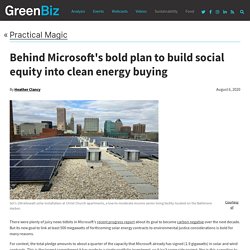
But its new goal to link at least 500 megawatts of forthcoming solar energy contracts to environmental justice considerations is bold for many reasons. For context, the total pledge amounts to about a quarter of the capacity that Microsoft already has signed (1.9 gigawatts) in solar and wind contracts. This is the largest commitment it has made to a single portfolio investment, so it isn’t some side project. 10 robie kamanyire.
How,sustainable,is,the,circular,economy. Circular economy isn't a magical fix for our environmental woes. The circular economy’s June jamboree in Finland, attended by around 1,500 experts and policymakers, showed just how much momentum the concept has gained in recent years.
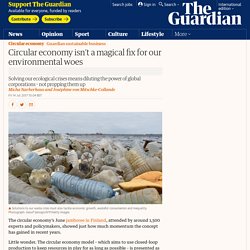
Little wonder. The circular economy model – which aims to use closed-loop production to keep resources in play for as long as possible – is presented as a pragmatic, win-win solution; an almost magical fix for our environmental woes. As well as easing climate change, resource depletion and waste, its backers promise economic growth and job creation too.
Big business can continue to flourish, buoyed by “new opportunities” and “expanding markets”. But this vision ignores the fact that on a finite planet endless economic growth is not an option. One of the tenets of the circular economy is the idea that closing material and product loops will prevent primary production. This suggests that the circular economy suffers from a similar rebound effect to energy-efficiency strategies. Alternative Futures: Creativity and the Circular Economy. Alternative Futures: Creativity and the Circular Economy presented a day of inspirational talks, workshops and performances exploring how we might use circularity as a framework for the distribution of wealth, what might ethical circular practice look like, and how might this transformative way of making and creating, change our relationship to objects, people and ourselves?
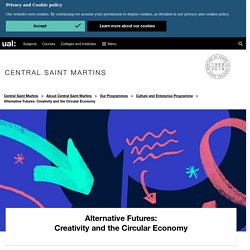
This event was produced by the Culture and Enterprise Programme at Central Saint Martins and took place on Friday 12 April 2019. Artifact from the Future: Reputation Statement. Oct 21, 2013 By Time Traveler Small contributions add up to real value.
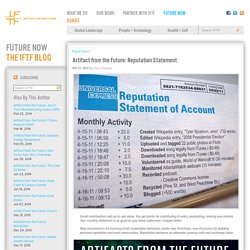
You get points for contributing to wikis, podcasting, sharing your photos. Your monthly statement is as good as your bank statement—maybe better. How actor Michelle Pfeiffer championed the world's first circular fragrance line. When Michelle Pfeiffer launched a perfume line in the spring, she wasn't just selling the brand as a movie star.
Celebrity role models leading behaviour change – owhite1
She was the co-founder of an innovative fragrance startup, realizing a longtime wish as a consumer and parent to enjoy a scent that wouldn’t bring ill-effects to her body or the environment.
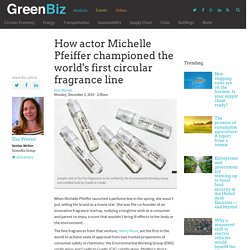
Business models & labour standards. Women: Powerful agents of change for an… 8th Mar 2019 by Catriona McLean GEC Gender inequality is not just a moral issue.
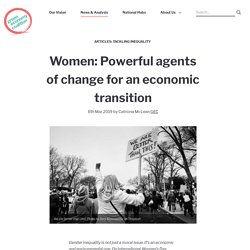
It’s an economic and environmental one. On International Women’s Day, Catriona McLean reveals why gender equality is essential for developing greener, fairer economies. Today marks International Women’s Day. Dignifying Lives of Women in Waste Management: Challenges and Way forward - Practical Action. Earlier in March at the 2019 UN Commission on the Status of Women (CSW63) I was able to share some initial insights about the gender issues facing women in Bangladesh who earn a living from solid waste management – in collecting rubbish from households and streets or in the recycling or reuse.
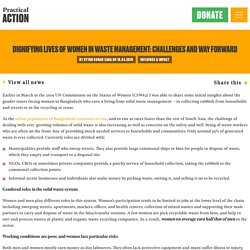
As the urban population of Bangladesh continues to rise, and to rise at rates faster than the rest of South Asia, the challenge of dealing with ever-growing volumes of solid waste is also increasing as well as concerns on the safety and well-being of waste workers who are often on the front-line of providing much needed services to households and communities. Only around 55% of generated waste is ever collected. Currently roles are divided with: Municipalities provide staff who sweep streets. Here’s What Could Go Wrong with the Circular Economy—and How to Keep it on Track. The circular economy—one that breaks the link between economic growth and use of limited resources and also cuts waste from the system—is on the minds of corporate sustainability professionals, governments and researchers.
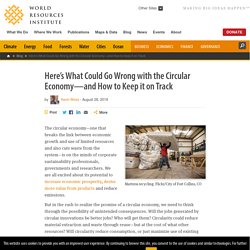
We are all excited about its potential to increase economic prosperity, derive more value from products and reduce emissions. Getting a stake in the green transition. Library of Things. Library of Things - reducing waste by borrowing rather than buying - Transition Network. But motivations for borrowing are not purely environmental – renting is also more cost-effective than buying, helps reduce clutter and is a low-barrier way to learn practical skills like repair and DIY.
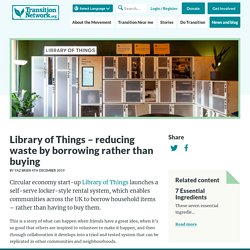
PodShare – Affordable Co-living. The sharing economy promotes sustainable societies. A simultaneous improvement in both ecological and economic efficiency is necessary to achieve the Sustainable Development Goals (SDGs).
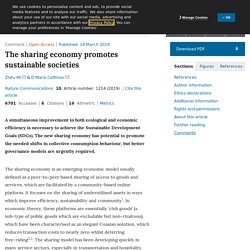
The new sharing economy has potential to promote the needed shifts in collective consumption behaviour, but better governance models are urgently required. The sharing economy is an emerging economic model usually defined as a peer-to-peer based sharing of access to goods and services, which are facilitated by a community-based online platform. It focuses on the sharing of underutilised assets in ways which improve efficiency, sustainability and community1.
In economic theory, these platforms are essentially ‘club goods’ (a sub-type of public goods which are excludable but non-rivalrous), which have been characterised as an elegant Coasian solution, which reduces transaction costs to nearly zero whilst deterring free-riding2,3. The sharing model has been developing quickly in many service sectors, especially in transportation and hospitality. References. 4 ways the sharing economy will develop in 2019. In 2019, it is a mind-bending exercise to reflect on the past decade of the sharing economy. A time traveller who skipped here from 2009 would note that it has fulfilled both more than, and less than, its original potential. The sharing economy’s explosive growth has astounded even optimistic market pundits. On the one hand, there are now many thousands of sharing economy platforms operating in almost every sector and activity around the world.
Back in 2009, there were only a handful: Zipcar, BlaBlaCar and Couchsurfing among them. Airbnb had launched in fall 2008, Uber in spring 2009. ABN AMRO City as a service ENG. 1. Sharing City - Seoul Metropolitan Government. New-paradigm-Sharing City Seoul proclaimed its Sharing City Seoul Project on September 20, 2012, along with a plan to conduct projects of sharing closely related to the lives of citizens, and to create and diffuse the base for the sharing. Seoul sees the Sharing City Seoul project as social innovation measures that have been designed to create new economic opportunities, to restore reliable relationships, and to reduce the wasting of resources with a view to resolving urban economic, social, and environmental problems all together. Notably, while the existing city policies focus on the construction of primary infrastructures such as roads, parking areas, schools, and libraries, the city’s future policies focus on the construction of secondary infrastructures such as spaces, objects, talents, and other unused resources in order to boost the utilization thereof.
Why Create the Sharing City Seoul Project The economy of sharing in Seoul. City as a Service Circle Economy 2018. Home. Mamaz Social Food - Eat with locals. Culdesac will be the U.S.'s first new car-free neighborhood. Everything You Need To Know About Universal Basic Income In 10 Minutes.
Uber drivers in UK cities strike over pay and conditions. Information in English. Can I participate in the project? Yes! We raffle off UNCONDITIONAL basic incomes and we encourage people from all over the world to take part and support the project. Although we cannot offer you a personally translated version of our website at this point, you may use online tools like Google translator to read our website in your preferred language. On this site we put together answers to the most important questions for you. CLIC Ilucidare workshop presentation.
CLIC session at ILUCIDARE Playground: Intrinsic value of cultural heritage as driver for heritage-led entrepreneurship - CLIC Project.